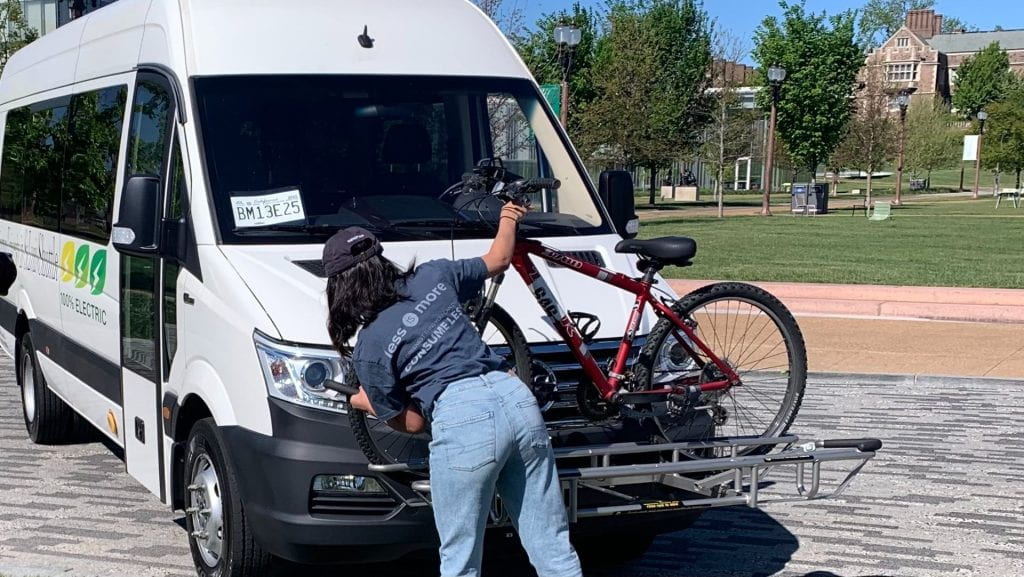Written by Office of Sustainability student associate, Faith Phillips, Class of 2024.
This is the Student Sustainability Spotlight, a series where we shine a light on important student-led initiatives on WashU’s campus and their positive, widespread impact on the university’s sustainable operations. There are a number of student-initiated and student-led projects that significantly contribute to the university’s sustainability goals. This series aims to spotlight and celebrate these projects and highlight student contributions as significant to WashU’s sustainability program.
Vehicles on campus contribute an estimated 10,000 metric tons of carbon dioxide emissions each year. WashU has been dedicated to working to decrease its emissions through targeted efforts concerning single occupancy vehicles, low carbon transportation and offering a robust portfolio of transportation options. 20,000 U-Passes are distributed every year which offer full-time students and employees free and unlimited access to the regional network of public buses and trains. There has also been a decrease in single occupancy vehicles commuting to the Danforth campus since 2013 and an increase in people not seeking parking permits.
Even with all these great initiatives, a student group called Net Impact recognized that the university could notably reduce its carbon dioxide emissions if the shuttles on campus were replaced with electric shuttles. We spoke with Nicole Mut, a recent graduate and former Office of Sustainability student associate, who majored in chemical engineering. Nicole was a part of Net Impact, an on-campus student group with national chapters focused on the intersection of business and the environment. Net Impact aims to focus on how institutions can enact more sustainable operations, usually in the form of campus projects, and was the source for the idea to transition the campus shuttles.

Nicole was a member of Net Impact during her sophomore year. During a brainstorm session at the beginning of the semester, club member Alaina Baumohl suggested circulator electrification which piqued Nicole’s interest. The idea grew into a thoroughly-researched proposal with specific data and projections on the benefits of electrifying the campus circulators. The proposal was given to several university stakeholders and very well-received. As fate would have it, the next summer saw tremendous flooding in the region and much of North Campus was submerged under water. WashU lost a significant portion of its fleet vehicles. Recognizing the opportunity to transition, Parking and Transportation (P&T), supported by the Office of Sustainability (OOS), took advantage of the circumstances and referred to Net Impact’s proposal.
P&T and the OOS were happy to bring on student support and offer opportunities for mentorship along the way. The project thus morphed into an opportunity for Nicole and another Net Impact member, Lauren Bruhl, to directly support sustainability operations through the nascent Vehicle Electrification student associate team in the OOS. Nicole had been wanting to join the OOS team since her freshman year and the electric circulator project gave her an opportunity to bring the idea to fruition with the guidance of the OOS and others within WashU administration.
“I was trusted to do research and draw conclusions that would lead to significant change on campus and the amount of responsibility placed on me really allowed me to rise to the occasion.”
Nicole Mut
The main goal for the electric vehicle (EV) project was to create and implement a roadmap for WashU fleet electrification. The process began with extensive research into what strategies were most effective for other institutions who had already initiated fleet electrification and EV charging, as well as how electric vehicles were received in the community. Nicole and Lauren connected with related campus departments and utilized surveys sent to the campus community to gather a more detailed understanding of WashU’s specific transportation and charging needs. This data was used to inform a request for proposal (RFP) sent out by the Parking & Transportation department for a new campus transportation provider that offered electric vehicles.
While much hard work had been done to reach this point, this was only the beginning of the fleet electrification plan. Following this, Nicole and Lauren conducted research on the various charging management systems. The goal was not to immediately replace all campus vehicles but instead construct a system that encourages electric vehicle adoption as vehicles are phased out. The way this was accomplished was by creating a fleet vehicle replacement form that assesses the benefits of electric vehicle replacement, a sortable EV database tool, and a data comparison sheet comparing emissions between internal combustion engine vehicles and electric vehicles based on the electricity sources specific to the region’s grid. These resources empower the community with the necessary information to make informed decisions about transitioning to EVs. As a result of Nicole and Lauren’s support, WashU transitioned from 2 to 22 electric fleet vehicles.
While Nicole engaged in plenty of important and exciting work during her time at WashU in both Net Impact & the Office of Sustainability, we asked her to share some of her highlights. Nicole expressed that she gained a lot of confidence throughout her time because she was treated as a peer in the critical discussions with faculty and supervisors while working on this project. “I was trusted to do research and draw conclusions that would lead to significant change on campus and the amount of responsibility placed on me really allowed me to rise to the occasion,” she said. Nicole also discussed how seeing the electric vehicles and high-tech chargers on campus before she graduated was rewarding and made her excited for the future of sustainable transportation at WashU. She was also able to apply her engineering degree to the field of sustainability which confirmed to her that there are jobs out there that excite and inspire her, pushing her to strive for the level of inspiration in her future career that was created during her time at the OOS.
As for Net Impact’s current plans, I spoke with Elizabeth Swords, a sophomore majoring in environmental analysis and the current president of Net Impact. In the past, Net Impact has worked with the Center for Career Engagement to host the Net Impact Career Expo in October. They have also received guidance from the Gephardt Institute on a mini-project they took on to develop a framework for environmental consulting. Elizabeth stated that this year, Net Impact is focusing a little less on projects and more on facilitating educational opportunities. At each meeting, they invite a WashU alum in a business or environmental related career to discuss their job and journey to acquiring the job which allows group members to better understand the options available to them in the field.
Without the hard work of Nicole and her Net Impact colleagues, the fleet electrification project would not have come to fruition in the same way it did. These students should be recognized and applauded for finding an opportunity where WashU can execute a lasting, sustainable change in its transportation program. Endorsing this project furthers the university’s commitment of sustainability to the St. Louis community and beyond and WashU can now become a case study for future institutions who embark on the fleet electrification process.
